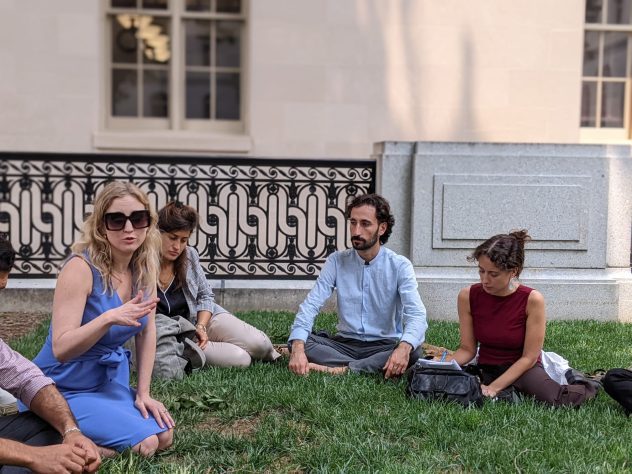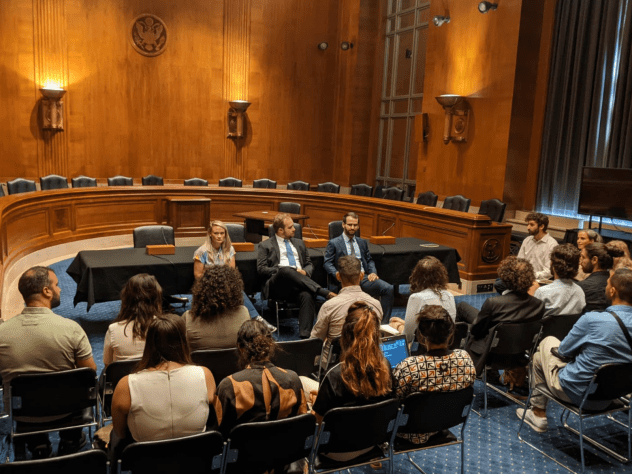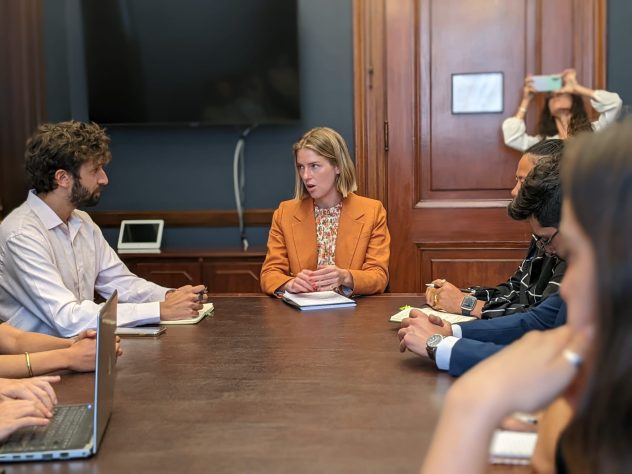Barak Talmor is one of our Alumni Coordinators. He is a 2020 alumnus of the Arava Institute, co-founder of “Face to Face”, a project connecting Palestinian stories with Israeli-Jewish communities through storytelling and dialogue, and is currently completing his B.A in Sustainability and Political Science in the honors program at the Reichman University.
The Arava Institute’s new NextGen Climate Changemakers—a group of 27 young adults roughly equal parts Israeli Jews, Israeli Arabs and Palestinians, and DC-area American Jews participating in a six-month program aimed at exploring transboundary cooperation on climate change and climate justice in the Middle East—recently embarked on a five-day journey to Washington, DC. Funded with generous support from the Jewish Federation of Greater Washington, this program included eight virtual meetings, one week-long trip to Israel, and the final DC trip.
Their unique trip emphasized the power of collaboration and direct action in the realm of environmental justice and cooperation. The Changemakers met with staff from the United States Institute of Peace, the Alliance for Middle East Peace, USAID, and the offices of three US senators. The group also explored the civil rights and environmental justice landscape of the city with a tour from the Anacostia Watershed Society.
On Day One, the group met with key officials from the US Environmental Protection Agency. The Acting Division Director of Environmental Justice provided an overview of the EPA’s long-standing commitment to ensuring a cleaner, healthier environment for all and delved into the EPA’s strategies in aiding indigenous communities and the necessity of promoting grassroots movements for ensuring environmental justice. A specialist in international environmental affairs provided a global context and the Senior Advisor for Climate Justice underscored the need to integrate climate action with the broader objectives of environmental equity.
The Environmental Law Institute (ELI) expanded our understanding of the intricate connections between environmental policy and legal action. Its representative emphasized the importance of legal frameworks in paving the way for green innovations and ethical business conduct. ELI’s staunch support for grassroots environmental movements particularly resonated with our team, highlighting the transformative power of community-led initiatives.
At the Environmental Defense Fund (EDF), Dr. Margot Brown emphasized the organization’s dedication to grassroots involvement, highlighting that the voices of those directly impacted by environmental issues are central to solution-building. The Chief Economist at EDF described the complexities of carbon trading systems and highlighted the transformative power of economics in sculpting robust environmental policies. Nora Moraga-Lewy at Conservation International offered an engaging discussion on conflict-sensitive conservation, emphasizing the importance of understanding regional socio-political dynamics when implementing conservation projects.
Our second day began with Swathi Veeravalli, representing the White House’s National Security Council. Ms. Veeravalli’s explained how she channels the inherent threats climate change poses to national security to secure substantial funds for climate combat initiatives. At the United States Institute of Peace, we learned of their research and policy recommendations and then had a fruitful dialogue about potential areas of collaboration. At USAID, some of our group members expressed their heartfelt gratitude for the transformative opportunities they received from the agency’s funding and initiatives. To wrap up the day, we participated in a vibrant happy hour with the 2023 New Story Leadership cohort, another program dedicated to nurturing the next generation of Palestinian and Israeli changemakers.
Our third day was not just a day of sightseeing but an essential day of cultural immersion and introspection. Our participants branched out two museums: the National Museum of the American Indian and the National Museum of African American History and Culture. After the museum visits, our group passionately discussed the relevance of the museums’ teachings to their own communities. The group pondered how themes of indigenous rights, reparations, and civil rights struggles mapped onto their own narratives.
On our fourth day, we explored the Anacostia River and prepared for our Capitol Hill meetings. Led by the Anacostia Watershed Society, a boat tour showed us the river’s natural habitat, its biodiversity, and the Society’s ongoing restoration efforts. The group discussed past neglect due to the river’s proximity to marginalized communities and the current challenges of gentrification amid restoration. Following the tour, the group participated in hands-on conservation activities to combat invasive species, supporting the growth of native trees and plants.
After the day’s activities we participated in a workshop led by Rabbi Michael Cohen, Director of Community Relations at Friends of the Arava Institute. Known for his extensive experience in environmental advocacy and interfaith dialogue. Rabbi Michael worked to prepare us for communicating impactful stories on capitol hill and ensured we had effectively strategized.
On Day Five, we were warmly welcomed by Saul Pilchen, Michael Friedman, and David Yaffe of the Jewish Federation of Greater Washington. Representatives of the NGCCM group articulated their transformative experiences within the program and then presented on their program projects. Our afternoon was spent in a series of meetings on Capitol Hill—a vital platform to advocate for our program’s objectives and to gain insights from the legislative sector. We met with staff members of Senators Sanders, Welch, and Whitehouse and presented a concise overview of NGCCM’s goals and interest in foreign and environmental policy. A separate delegation met with Kari Reid, director of the Alliance for Middle East Peace, where they discussed shared objectives and the potential for collaborative opportunities.
As the sun set on our busy day, the group met to debrief, reflect, and look towards the future as the participants officially became part of the Arava Institute alumni community.



